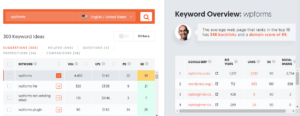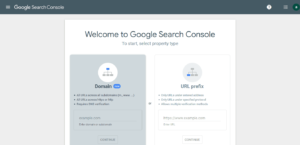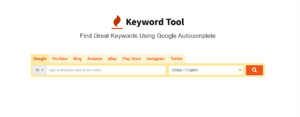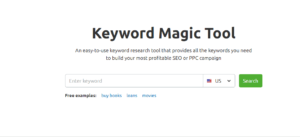Effective keywords research presides a successful content marketing campaign. Either you’re running paid ads (PPC) or optimizing for organic traffic, your keyword selection determines the success of your content.
Without knowing the exact words users are typing into the search engines to look up relevant information related to your business,
Using the right keyword tool will help simplify the entire keyword research process and making it painlessly complete. More often, marketer’s lookout for an expensive or complex keyword research tool to perform the task, while in reality, you don’t need expensive or complex tools to perform effective keyword research.
Except you’re looking for a unique keyword research and analysis features, the below keyword tools are enough to get you going.
In this post, I will give you 8 of the best keyword tools to do quick keyword research either for your PPC or organic traffic campaign.
#1. Google Keywords Planner

The most widely used keyword research tool on the planet today.
But from an
Nevertheless, it is still the most trusted and accurate keyword research tool data. What’s more, unlike many other keywords research tool, Google keyword planner is completely free to use.
You only need a Gmail account to log in.
#2. UberSuggest

Ubbersuggest was bought by Neil Patel for $120,000 in 2017, and since then, lots of
It is now a more
The keyword feature of Ubersuggest offers more keyword research data for PPC marketing, organic SERP optimization, and competitor analysis research.
Ubersuggest keyword tool group keyword ideas into five categories:
- Suggestions.
- Preposition.
- Question.
- Comparison.
- Related.
It also shows you the average search volume, CPC (cost-per-click), PD (Paid difficulty), SD (SEO Difficulty) of your choosing keyword. The keyword metrics allow you to make a better marketing decision when research a winning keyword.
#3. Google Trend

Google trend is one of my favorites and must use keyword research tools.
The keyword tool provides you with the trend or the popularity of a given search query over a period of time. It is a powerful keyword tool for analyzing the popularity of word synonymy.
Let’s say you’re writing about vacation rental homes.
Technically, “home” and “house” mean the same thing to many people and are used simultaneously during a conversation. But your ideal audience may be using a particular word (home vs house) more often to find the information they need.
And in marketing, words are more valuable than each other. So you need a keyword research tool that lets you discover winning words your idea users are typing into search engines to find what matters to them.
A good keyword tool to discover the most used word is Google trend. It let you quickly compare two or more search queries side by side to analyze their popularity over time.
#4. Google Search Console

Google search console is not your typical keyword research tool.
But a tool to discover what’s already working for your published content that you can improve upon. Many of the time, updating your existing content is all you need to triple your organic search traffic and drive more relevant sales traffic.
Google search console gives your insight into the search queries your existing content rank for. The pages and search queries that generate impressions.
Go into your search console account and select the web property you want to analyze. From there click on “performance” to generate the graph chart. Just right under the graph chart, you’ll see a list of queries that generate search impressions for the past 3 months.
Now, click on the pages tab to see a list of pages that are associated with these search queries. The next thing you need to do is to research these queries and pick the most profitable for your business.
Use a keyword tool like the Google keyword planner or SEMrush keyword magic tool to analyze the profitability and relevancy of the search query. Don’t just plug every query in the search console into your blog content because search console reports your pages are getting the impression from these queries.
Some keywords found in your search console data won’t be relevant or profitable to your business, pick the ones that matter to your business, and update the associated page with it.
#5. KeywordTool.io

This is one of the best long-tail keyword finders keyword research tool today.
Plug-in your seed keyword, wait a few seconds, and you have a list of relevant long-tail keywords users are typing into the search engines related to your seed keyword.
Like Ubersuggest, KeywordTool filters your keyword data into three categories:
- Question.
- Keyword Suggestion.
- Preposition.
There are other search filters you can run keyword data from. You can base your filter to search within YouTube search engines, Twitter, Play store, Bing, etc.
And it gives the option to run keyword data from Google image search, video, or news search only. For PPC advertisers, KeywordTool can be a very useful keyword tool to run a PPC campaign by filtering negative keyword words.
#6. SEMrush Keyword Tool

The SEMrush keyword tool is a very powerful keyword research tool. One of the most complete and advanced keyword analysis tools today. With over 20Billion keywords in its database, a single keyword query can return up to 14 million relevant ideas.
This is a keyword tool developed for both PPC advertisers and
SERP features. Word count. Exact match. Broad match. Questions. Phrase match. Word Group. Search Volume. Cost Per Click (CPC). Keyword difficulty (KD). SERP Result.
The SEMrush keyword magic tool is a very powerful and feature-rich keyword research tool. Whatever your need for keyword research, the SEMrush keyword magic tool is good to give a try.
#7. Google

Little did you know that Google.com is a keyword tool.
As you typed in your seed keyword, Google autocompletes shows you relevant long-tail search terms from your seed keyword. These are long-tail keywords users are typing into Google search engine to find information relevant to your business.
It is a quick way to discover what your ideal audience is searching for through Google search engines.
The “People Also Ask” feature on the Google SERP is a great keyword feature to discover relevant search terms related to your primary search phrase.
#8. Soolve

Soolve is a unique keyword research tool in the sense that it unites the keywords data in all the major search engines together in one simple user interface.
It let you quickly run keyword research across multiple search engines without having to visit individual websites. It is a simple yet powerful keyword research tool for content marketers. It took after Google autocomplete features to run keyword data.
As you typed in your seed keyword, the tool generates keyword ideas for individual search engines from their database. This is a very helpful keyword feature to do a comparison test and keyword analysis.
Using KeywordGenerator can help you call attention to your article with keywords and/or hashtags that are featured in various search engines. It can even show you the trending volume of the keyword you select. In this way, you can use the information to boost the maximum visibility and reach of your site.
Conclusion
Using the right keyword tool is one of the keys to effective PPC and
These 8 keyword research tools are enough to get you going with discovering the exact words your users are typing into the search engines.
DepositPhotos – keyword research


